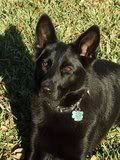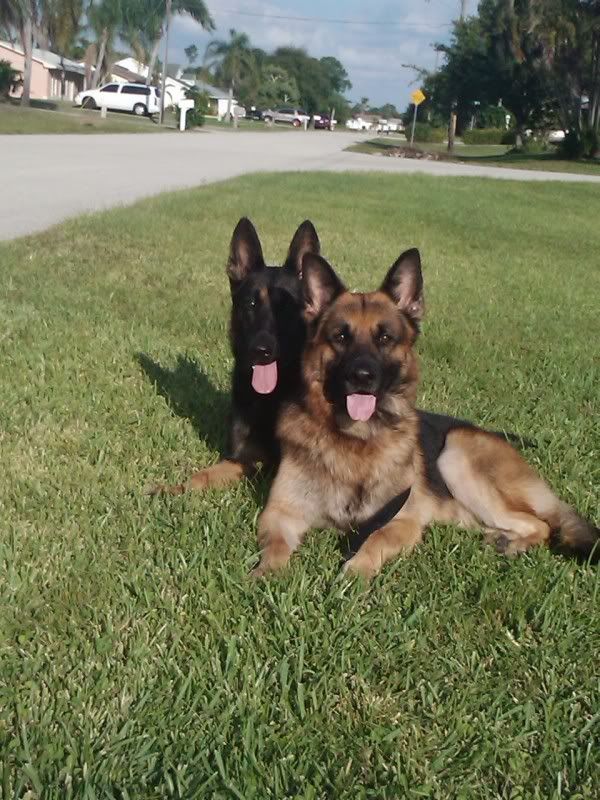 Re: HELP!
[Re: Rebekah Schwartz ]
#144441 - 06/11/2007 10:24 PM Re: HELP!
[Re: Rebekah Schwartz ]
#144441 - 06/11/2007 10:24 PM |
Webboard User
  
Reg: 11-29-2005
Posts: 375
Loc: Houston, Texas
 Offline Offline |
|
Rebekah, I'm not an expert by a long shot, but in regards to dog parks let me say this: unless he's on a leash and there are no other people or dogs in the park you can't be assured something bad won't happen eventually. I take mine to a dog park sometimes but we won't go in unless there's only one or two dogs and they have to be on a leash. If there is ONE dog not on leash we don't even get out of the car. I also judge the owners and the breeds of dogs. If I see ANY terrier breeds no matter the size we don't go in. I only let her off leash inside the park when we are alone and at the back of the park away from the entrance. That way if anyone comes in I can quickly get her on leash before she notices any other dogs/people. You are asking for trouble with a people aggressive dog not on a leash in a dog park. Also, if you continue to go to the dog park, don't stop and let the dog stake out anyplace as his. Keep moving and stay alert. I agree with Howard, I think you may have a fear-biter with weak nerves, actually. Best of luck to you, sincerely, and keep coming here and reading. There are GREAT people here who have tons of experience and knowledge.
And I second Connie's recommendations!!! Ed's training dvd's are expertly done, simple and easy to understand, thorough, and LOADED with more information than you'll be able to absorb for a very long time.
If you can make the drive, I think Howard could possibly help you with an evaluation. Just be prepared to do what he suggests!!!
 Brenna
|
 Top Top
|
 Re: HELP!
[Re: Mike Morrison ]
#144442 - 06/11/2007 10:36 PM Re: HELP!
[Re: Mike Morrison ]
#144442 - 06/11/2007 10:36 PM |
Webboard User
Reg: 06-10-2007
Posts: 77
Loc: Jupiter Fl
 Offline Offline |
|
Im going to be meeting Howard some time in the next couple of weeks. Could someone explain fear biting? When he is in the car trying to get someone in the car next to us, he is wagging his tail, he seems happy. I dont know, plain and simple. I hope Howard can give me some insight to this dog.
|
 Top Top
|
 Re: HELP!
[Re: Rebekah Schwartz ]
#144443 - 06/11/2007 10:52 PM Re: HELP!
[Re: Rebekah Schwartz ]
#144443 - 06/11/2007 10:52 PM |
Webboard User
  
Reg: 11-29-2005
Posts: 375
Loc: Houston, Texas
 Offline Offline |
|
It's more complicated than just that one explanation, Rebekah...however, a fear biter would be a very unstable dog that bites because he's afraid/nervous/unsure/insecure. I believe most of the time it's a genetic thing, but it can certainly be learned...it can be made worse by you not asserting yourself as the pack leader and controlling him when he goes off. When he feels like you're not in control, he feels motivated to step up and take that role...he has to be for both of you--at least in his head he does. That's where all kinds of very dangerous problems can occur.
There are others here who can explain the small print explanations better than I can, but I think that's the big picture definition.
 Brenna
|
 Top Top
|
 Re: HELP!
[Re: Rebekah Schwartz ]
#144450 - 06/12/2007 12:28 AM Re: HELP!
[Re: Rebekah Schwartz ]
#144450 - 06/12/2007 12:28 AM |
Webboard User

  
Reg: 08-06-2005
Posts: 615
Loc: San Diego, CA
 Offline Offline |
|
Could someone explain fear biting? When he is in the car trying to get someone in the car next to us, he is wagging his tail, he seems happy.
A complicated subject. There are several types of aggression. Here's a quick answer, basically with some excerpts gathered from my reading of "The Dog's Mind, Understanding Your Dog's Behavior" by Fogle - a good read, BTW. It's not about training, but provides a good understanding of psychology and physiology of how your dog's mind works.
Fear aggression is defensive and primarily a learned behavior, and therefore more treatable, as oppossed to dominance aggression which is primarly genetic and difficult to alter.
A pup/dog can develop a fear of the unusual if he does not experience sights, smells and noises during his formative socialization period (about 4 - 6 wks.) Fear is the natural self-preservation response of all animals to new or unusual situations and is the most common response of all captive animals towards humans. It is the most common type of aggression that pet dogs exhibit. The dog's response to fear or pain is a mixture of physical, physiological and emotional. Although most commonly originating during the socialization period, fear behavior can develop at any age.
The body posture of fear can include ears plastered back, tail low or between the legs, usually wagged in short quick strokes.
Fear behavior is reinforced by learning, e.g., the dog shows fear and snaps at someone who approaches, they back off and the dog learns that snapping when fearful works.
So it's best avoided by proper socialization of pups, but because it is learned, there are a number of ways to treat it.
For more details and treatment ideas, see Fogle's book or similar ones listed/available here and elsewhere. And Howard will be able to help you a lot.
Mike
Suppose you were an idiot.
Suppose you were a member of Congress.
But I repeat myself.
-Mark Twain |
 Top Top
|
 Re: HELP!
[Re: Mike Armstrong ]
#144456 - 06/12/2007 06:40 AM Re: HELP!
[Re: Mike Armstrong ]
#144456 - 06/12/2007 06:40 AM |
Webboard User
Reg: 01-28-2005
Posts: 133
Loc: nyc
 Offline Offline |
|
Hi Rebekah-
Dashing out the door as I write this, and havent read the entire thread but your dog sounds so much like mine in SOME regards, that I feel compelled to write you.
First off, Connie Southerland and Howard Knauf are both very knowledgeable and sound in their advice from all I have read on this and other subjects.
Two, often people on the board come off (intentionally or otherwise) as extremely critical and harsh. This is part and parcel of any subculture where a few experts feel they can abandon any pretense of civility to people who know less than them. This is a shame, but it is the price of seeking advice here.
Third, I had a 100lb rescue GSD that had some similar patterns. He was unpredictable human aggessive. Calmy walking down the streets of Manhattan until someone broke his "comfortable" distance and then he'd lunge/bark. As soon as the person cleared the distance (usually .05 Seconds later) he was back to his old self. Not agitated, not riled up. Also similar to yours, mine would go bonkers in the car, if cab drivers spoke up, or when we'd pull up to a toll booth.. As soon as we were back in motion, or the cabbie shut up, he was fine again.
At the time, I was very inexperienced, but I loved this dog like you wouldnt believe and couldnt give him up. So I found this board, did a lot of reading, and was very, VERY careful in plotting my steps with progressing his training, especially around people. It does take time and it is hugely stressful, but it can be done
Do your due diligence, but hang in there!
|
 Top Top
|
 Re: HELP!
[Re: brock wilson ]
#144530 - 06/12/2007 05:40 PM Re: HELP!
[Re: brock wilson ]
#144530 - 06/12/2007 05:40 PM |
Webboard User
Reg: 06-10-2007
Posts: 77
Loc: Jupiter Fl
 Offline Offline |
|
Thanks everyone for all the advice. Im going to meet with Howard this weekend, and hopefully come up with whats going on in this dogs head.
|
 Top Top
|
When purchasing any product from Leerburg Enterprises, Inc. it is understood
that any and all products sold by Leerburg Enterprises, Inc. are sold in Dunn
County Wisconsin, USA. Any and all legal action taken against Leerburg Enterprises,
Inc. concerning the purchase or use of these products must take place in Dunn
County, Wisconsin. If customers do not agree with this policy they should not
purchase Leerburg Ent. Inc. products.
Dog Training is never without risk of injury. Do not use any of the products
sold by Leerburg Enterprises, Inc. without consulting a local professional.
The training methods shown in the Leerburg Ent. Inc. DVD’s are meant
to be used with a local instructor or trainer. Leerburg Enterprises, Inc. cannot
be held responsible for accidents or injuries to humans and/or animals.
Copyright 2010 Leerburg® Enterprises, Inc. All rights reserved. All photos and content on leerburg.com are part of a registered copyright owned by Leerburg Enterprise, Inc.
By accessing any information within Leerburg.com, you agree to abide by the
Leerburg.com Privacy Policy and Terms of Use.
 Previous Topic
Previous Topic Index
Index Next Topic
Next Topic












 Brenna
Brenna Top
Top



.jpg)